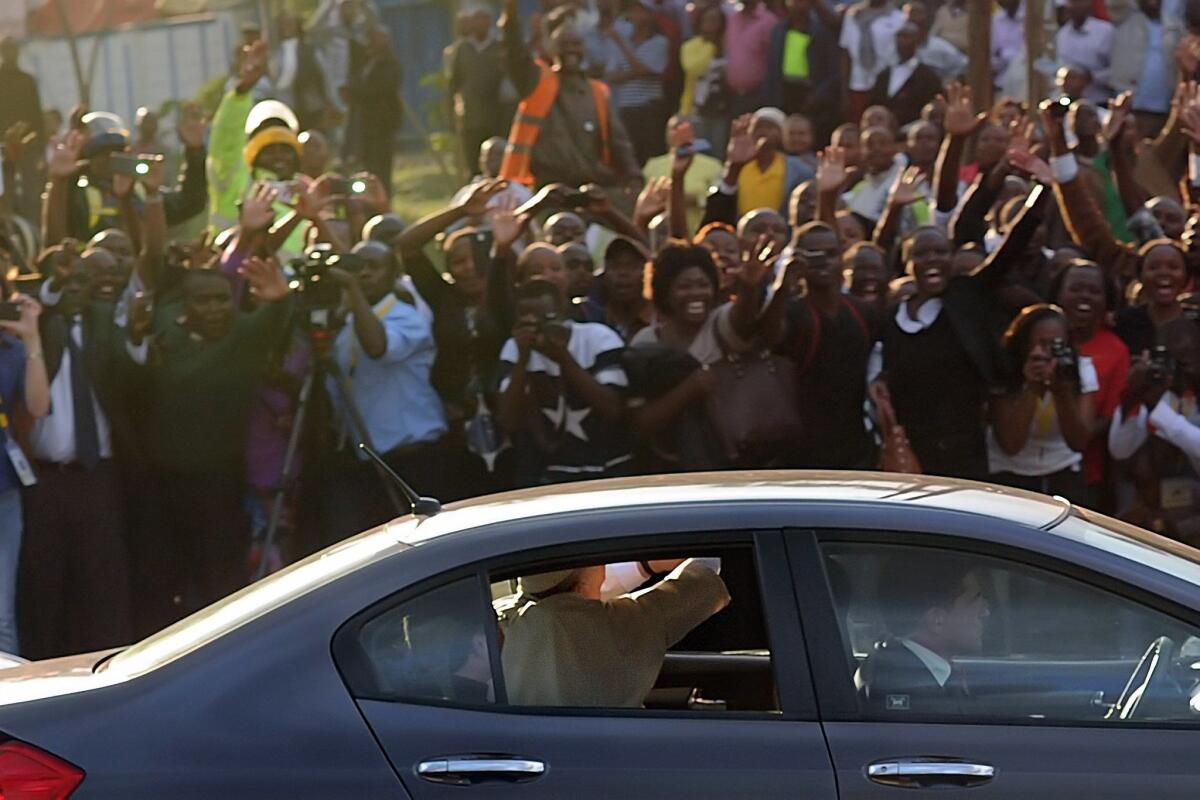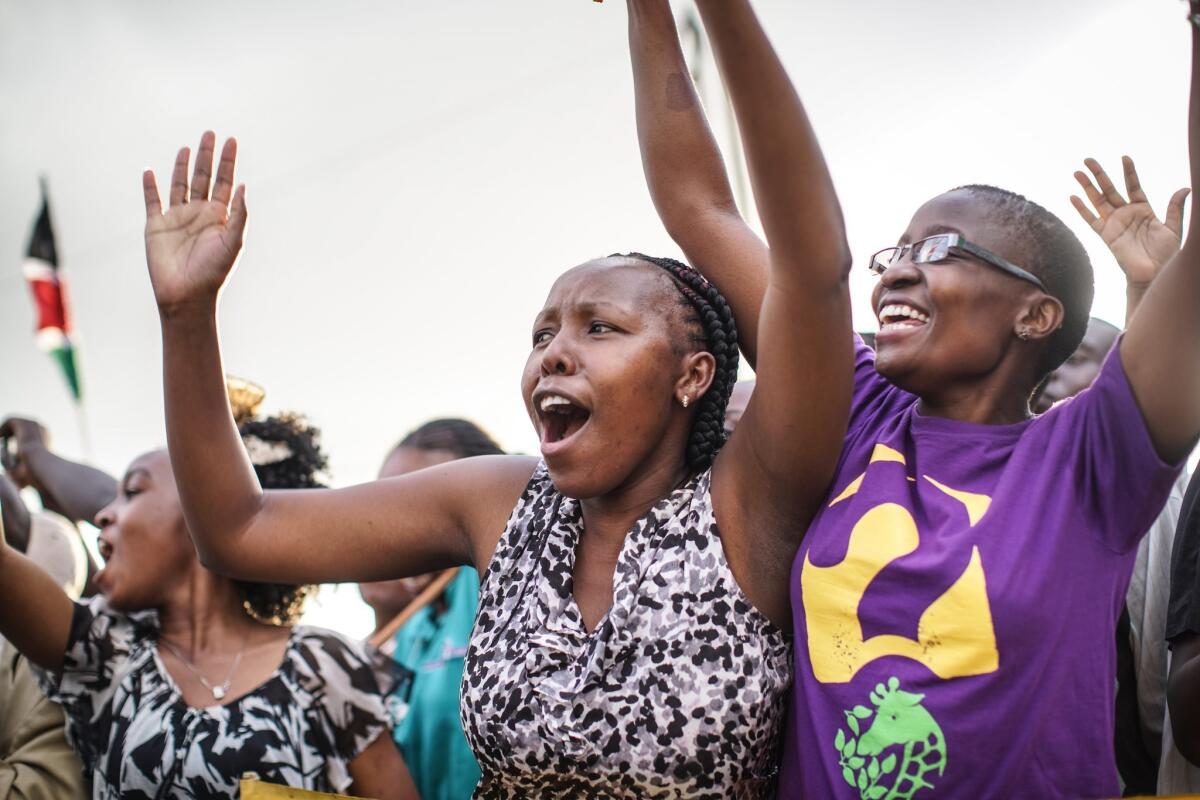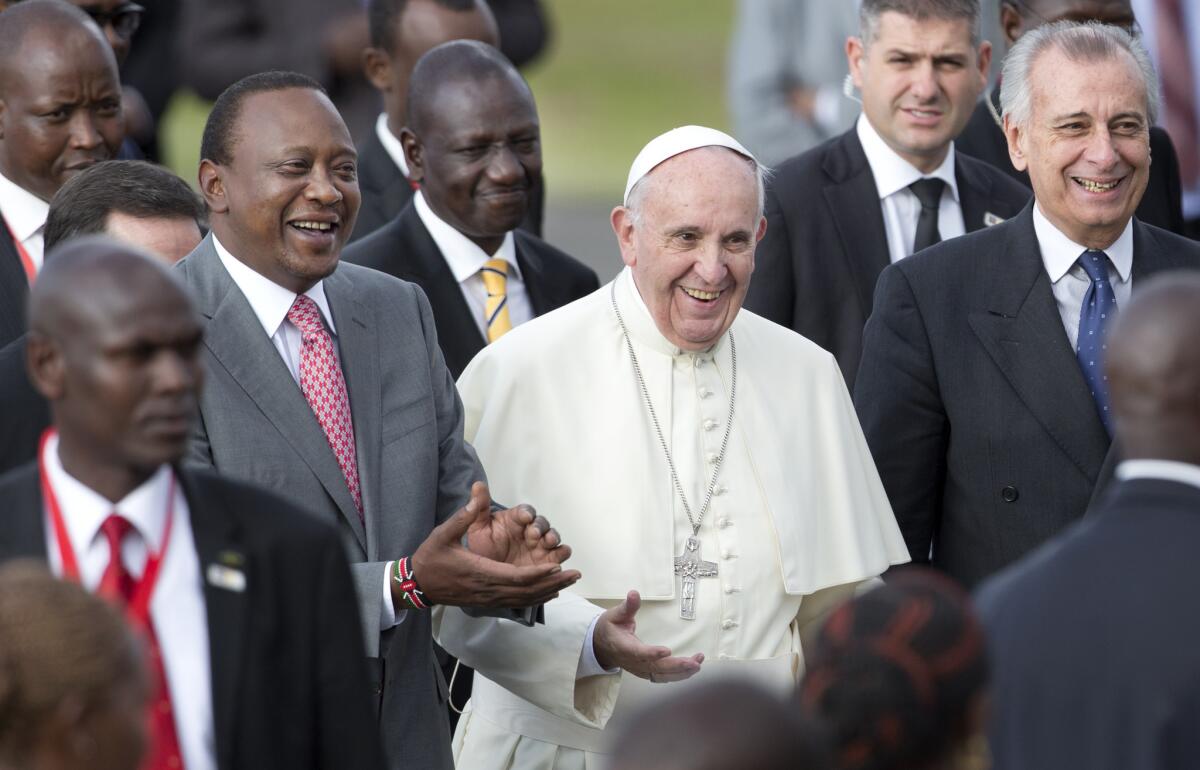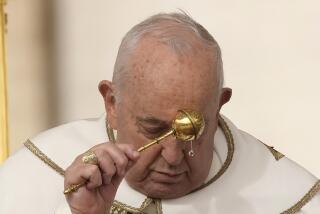Pope Francis calls for unity, links terror to poverty as he launches Africa tour

Pope Francis, riding in a Honda sedan, waves at crowds as he passes through the streets of Nairobi, Kenya, on Nov. 25.
- Share via
Reporting from Johannesburg, South Africa — Almost as soon as Pope Francis alighted from his flight to Kenya’s capital on his first trip to Africa, he sent a powerful message of humility and equality.
The pope stunned Kenyans not only by riding in a modest gray Honda through Nairobi’s streets, but also by traveling with the window down, waving to onlookers, eschewing the fancy cars and dark tinted windows favored by local politicians.
“The Honda car that the pope is using. Even an MP of the poorest slum in Kenya would not use it,” tweeted one Kenyan, Gibson Maina.
“If there is a lesson to learn from him is humility. He’s so humbled unlike our politicians,” tweeted another, Samuel Kungu.
The Africa tour sees Francis visiting Kenya and Uganda, countries that have suffered deadly attacks from Islamist extremists, as well the Central African Republic, which has been torn apart by violence between Muslims and Christians.

Crowds cheer from the roadside as Pope Francis’ motorcade drives through Nairobi, Kenya, on Nov. 25.
The trip involves plenty of security headaches. But Francis brushed aside such fears in comments to journalists before his departure from Rome.
“To tell you the truth, the only thing I’m concerned about is the mosquitoes,” he said.
He has resisted pressure to cancel the final leg of his tour, an overnight visit to Central African Republic, where sectarian attacks have continued since rebels ousted the government in 2013. There has been speculation that he might have to curtail some parts of his schedule in the capital, Bangui, where he plans to visit a mosque in one of the city’s volatile neighborhoods.
Millions are expected to attend Masses in Kenya and Uganda. In each country, at least 10,000 police are being deployed.
Africa, home to more than 200 million Roman Catholics, or about 17% of the faith’s global population, has long been one of the church’s fastest growing regions. However, it faces a challenge from more charismatic Christian churches that also are rapidly growing.
Kenyan officials have said the trip will differ from President Obama’s visit in July, which saw many roads blocked and people discouraged from trying to see him.
“Unlike the visit by President Barack Obama when the government encouraged Kenyans to stay home, we are encouraging Kenyans to flock into the city in their numbers to cheer the pope and celebrate Mass with him,” government spokesman Manoah Esipisu told journalists before the Francis’ visit.
Esipisu said about 1 million people were expected to flock to Nairobi to see the pope.

Pope Francis is accompanied by Kenyan President Uhuru Kenyatta, left, and Deputy President William Ruto, second from left, in Nairobi on Nov. 25.
In a speech to Kenyans that was televised live, Francis touched on poverty, inequality, the need for a just distribution of resources, reconciliation, peace and the environment.
In a world reeling after recent terror attacks by Islamic extremists in Paris, Beirut, Nigeria, Mali, Egypt and Tunisia, the pontiff called for dialogue to improve interfaith understanding.
“As we fight this war, recent events around the world have indeed taught us that we must do even more to bring unity and understanding between faiths, between ethnicities, between races but also between nations,” he said.
He said poverty and inequality breed terrorism, violence and war.
“All men and women of goodwill are called to work for reconciliation and peace, forgiveness and healing,” he said. “Experience shows that violence, conflict and terrorism feed on fear, mistrust and the despair born of poverty and frustration.
“Ultimately, the struggle against these enemies of peace and prosperity must be carried on by men and women who fearlessly believe in, and bear honest witness to, the great spiritual and political values which inspired the birth of the nation,” he said.
In Kenya, ranked 145th of 175 countries on the Transparency International perceptions of corruption list, the pope said leaders had a special responsibility to work for the common good.
“The Gospel tells us that from those to whom much has been given, much will be demanded. In that spirit, I encourage you to work with integrity and transparency for the common good, and to foster a spirit of solidarity at every level of society,” Francis said.
He met with Kenyan President Uhuru Kenyatta, who is Catholic, at State House, where he also planted a tree.
“I am told that here in Kenya it is a tradition for young schoolchildren to plant trees for posterity,” he said in his speech. “May this eloquent sign of hope in the future, and trust in the growth which God gives, sustain all of you in your efforts to cultivate a society of solidarity, justice and peace on the soil of this country and throughout the great African continent.”
On Thursday, Francis will deliver a speech on the environment at the U.N. Environment Program headquarters in Nairobi, with key international talks on climate change in Paris due to begin at the end of the month.
He told Kenyans that the environment and natural resources were gifts from God and there was an obligation to protect them for future generations.
“We have a responsibility to pass on the beauty of nature in its integrity to future generations, and an obligation to exercise a just stewardship of the gifts we have received,” Francis said.
On Friday, he will visit Kangemi, a crowded and squalid slum on the outskirts of Nairobi.
In Uganda where, politicians have repeatedly tried to impose the death penalty for homosexuality and newspapers have published the names, addresses and photographs of gays and lesbians, activists are hoping the pope will deliver a message of tolerance.
In the past Francis has emphasized the church’s position that while it sees homosexuality as “sinful” it also believes gays and lesbians shouldn’t be persecuted.
“If a person is gay and seeks God and has goodwill, who am I to judge?” he said famously in 2013.
Follow @robyndixon_LAT on Twitter for news out of Africa
More to Read
Sign up for Essential California
The most important California stories and recommendations in your inbox every morning.
You may occasionally receive promotional content from the Los Angeles Times.










